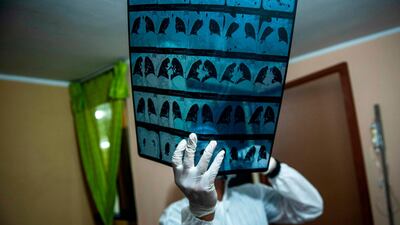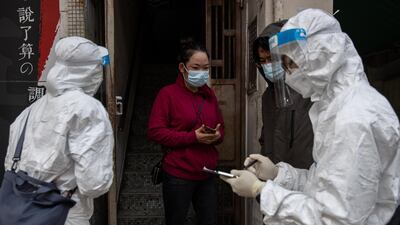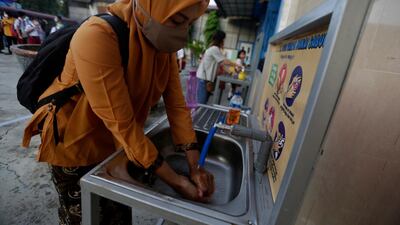Oman extended the closure of its borders until February 8 after new strains of coronavirus were detected.
The sultanate closed its borders for a week on January 18 and the latest decision marks a second extension.
On Monday, Minister of Health Dr Ahmed Al Saeedi said Oman detected six cases of mutant strains, but did not specify which ones they were.
He said that the number of patients admitted to hospital with Covid-19 had doubled to 102 in two weeks.
"Doubling of the number is very worrying and frightening. We see individuals shake hands and embrace as if the virus and the pandemic have ended," Dr Al Saeedi said in a statement.
But he ruled out a total lockdown in Oman and said it was not “necessary for now”.
Last weekend, Oman received 100,000 doses of Oxford-AstraZeneca vaccines manufactured under licence by the Serum Institute of India, but the Ministry of Health did not say when the next round of vaccinations will begin.
On January 28, Oman announced an indefinite ban on public and private gatherings as daily Covid-19 cases increased.
The sultanate's supreme committee responsible for tackling the pandemic said the ban included educational institutions, weddings, conferences, seminars and exhibitions.
Oman began its vaccination campaign using Pfizer-BioNTech inoculations on December 7.
Since then, about 30,000 people have been vaccinated.
In a statement to Oman Television on Sunday, the Health Ministry urged people to take the vaccinations and not respond to rumours about the inoculations on social media.
Dr Al Saeedi said the next batch of Pfizer-BioNTech vaccines would arrive in six weeks, owing to problems faced by manufacturers.
The minister confirmed that Oman has ordered 2.5 million doses from Pfizer-BioNTech and other vaccine makers while orders for a further two million doses were being made.
Oman registered 198 more coronavirus cases and three deaths on Sunday.
The total number of cases in Oman is now 134,524, including 1,532 deaths and 126,949 recoveries.
-

Emergency medical technician Thomas Hoang, left, of Emergency Ambulance Service, and paramedic Trenton Amaro prepare to unload a Covid-19 patient from an ambulance in Placentia, California. AP Photo -

A doctor checks an X-ray of a Covid-19 patient in a house on the eastern outskirts of Lima. AFP -

Reena Jani, 34, a health worker, receives the vaccine developed by Oxford/AstraZeneca at Mathalput Community Health Centre in Koraput, India. Reuters -

Christian Y. Schmidt picks up a candle at a makeshift memorial for Covid victims at Arnswalder Platz in Berlin, Germany. Getty Images -

Civil servants check a local resident for her negative Covid-19 test results before allowing her outside, in the Jordan district in Hong Kong, China. EPA -

A cleaner wipes down the net after a player's practise session in Melbourne with players allowed to train while serving quarantine for two weeks ahead of the Australian Open tennis tournament. AFP -

Workers walk through Samut Sakhon Shrimp Center as they disinfect the market in Samut Sakhon, Thailand. AFP -

A teacher washes her hands at a school in Banda Aceh, Aceh, Indonesia. EPA -

Customers and employees are seen in a Godiva chocolate store in Atlanta, Georgia. AFP -

People go about their daily life in the centre of Milan during the second wave of the Covid-19 pandemic in Italy. EPA -

A boy works on a mask-clad snowman on Primrose hill during snowfall in London, Britain. Reuters -

Workers wearing masks clean a lotus pond in Tokyo. AP Photo -

Cars make their way through lines of cones as they arrive for a UCHealth drive-up mass Covid-19 vaccination event in the parking lots of Coors Field in Denver, Colorado. The Denver Post via AP
You might also like
The%20specs%20
Common%20symptoms%20of%20MS
In numbers: PKK’s money network in Europe
Germany: PKK collectors typically bring in $18 million in cash a year – amount has trebled since 2010
Revolutionary tax: Investigators say about $2 million a year raised from ‘tax collection’ around Marseille
Extortion: Gunman convicted in 2023 of demanding $10,000 from Kurdish businessman in Stockholm
Drug trade: PKK income claimed by Turkish anti-drugs force in 2024 to be as high as $500 million a year
Denmark: PKK one of two terrorist groups along with Iranian separatists ASMLA to raise “two-digit million amounts”
Contributions: Hundreds of euros expected from typical Kurdish families and thousands from business owners
TV channel: Kurdish Roj TV accounts frozen and went bankrupt after Denmark fined it more than $1 million over PKK links in 2013
BRAZIL SQUAD
Alisson (Liverpool), Daniel Fuzato (Roma), Ederson (Man City); Alex Sandro (Juventus), Danilo (Juventus), Eder Militao (Real Madrid), Emerson (Real Betis), Felipe (Atletico Madrid), Marquinhos (PSG), Renan Lodi (Atletico Madrid), Thiago Silva (PSG); Arthur (Barcelona), Casemiro (Real Madrid), Douglas Luiz (Aston Villa), Fabinho (Liverpool), Lucas Paqueta (AC Milan), Philippe Coutinho (Bayern Munich); David Neres (Ajax), Gabriel Jesus (Man City), Richarlison (Everton), Roberto Firmino (Liverpool), Rodrygo (Real Madrid), Willian (Chelsea).
25%20Days%20to%20Aden
MATCH INFO
South Africa 66 (Tries: De Allende, Nkosi, Reinach (3), Gelant, Steyn, Brits, Willemse; Cons: Jantjies 8)
Canada 7 (Tries: Heaton; Cons: Nelson)
Brief scores
Toss India, chose to bat
India 281-7 in 50 ov (Pandya 83, Dhoni 79; Coulter-Nile 3-44)
Australia 137-9 in 21 ov (Maxwell 39, Warner 25; Chahal 3-30)
India won by 26 runs on Duckworth-Lewis Method
'I Want You Back'
Director:Jason Orley
Stars:Jenny Slate, Charlie Day
Rating:4/5
Top Hundred overseas picks
London Spirit: Kieron Pollard, Riley Meredith
Welsh Fire: Adam Zampa, David Miller, Naseem Shah
Manchester Originals: Andre Russell, Wanindu Hasaranga, Sean Abbott
Northern Superchargers: Dwayne Bravo, Wahab Riaz
Oval Invincibles: Sunil Narine, Rilee Rossouw
Trent Rockets: Colin Munro
Birmingham Phoenix: Matthew Wade, Kane Richardson
Southern Brave: Quinton de Kock
How will Gen Alpha invest?
Mark Chahwan, co-founder and chief executive of robo-advisory firm Sarwa, forecasts that Generation Alpha (born between 2010 and 2024) will start investing in their teenage years and therefore benefit from compound interest.
“Technology and education should be the main drivers to make this happen, whether it’s investing in a few clicks or their schools/parents stepping up their personal finance education skills,” he adds.
Mr Chahwan says younger generations have a higher capacity to take on risk, but for some their appetite can be more cautious because they are investing for the first time. “Schools still do not teach personal finance and stock market investing, so a lot of the learning journey can feel daunting and intimidating,” he says.
He advises millennials to not always start with an aggressive portfolio even if they can afford to take risks. “We always advise to work your way up to your risk capacity, that way you experience volatility and get used to it. Given the higher risk capacity for the younger generations, stocks are a favourite,” says Mr Chahwan.
Highlighting the role technology has played in encouraging millennials and Gen Z to invest, he says: “They were often excluded, but with lower account minimums ... a customer with $1,000 [Dh3,672] in their account has their money working for them just as hard as the portfolio of a high get-worth individual.”
Tamkeen's offering
- Option 1: 70% in year 1, 50% in year 2, 30% in year 3
- Option 2: 50% across three years
- Option 3: 30% across five years
MORE FROM ED HUSAIN: The UAE-Israel accord is a win for every Muslim
How does ToTok work?
The calling app is available to download on Google Play and Apple App Store
To successfully install ToTok, users are asked to enter their phone number and then create a nickname.
The app then gives users the option add their existing phone contacts, allowing them to immediately contact people also using the application by video or voice call or via message.
Users can also invite other contacts to download ToTok to allow them to make contact through the app.
How to protect yourself when air quality drops
Install an air filter in your home.
Close your windows and turn on the AC.
Shower or bath after being outside.
Wear a face mask.
Stay indoors when conditions are particularly poor.
If driving, turn your engine off when stationary.
Labour dispute
The insured employee may still file an ILOE claim even if a labour dispute is ongoing post termination, but the insurer may suspend or reject payment, until the courts resolve the dispute, especially if the reason for termination is contested. The outcome of the labour court proceedings can directly affect eligibility.
- Abdullah Ishnaneh, Partner, BSA Law
While you're here
Hussein Ibish: There are reasons for Democrats and Republicans to be happy
Rashmee Roshan Lall: Who are the women driving Joe Biden's success?
The burning issue
The internal combustion engine is facing a watershed moment – major manufacturer Volvo is to stop producing petroleum-powered vehicles by 2021 and countries in Europe, including the UK, have vowed to ban their sale before 2040. The National takes a look at the story of one of the most successful technologies of the last 100 years and how it has impacted life in the UAE.
Read part four: an affection for classic cars lives on
Read part three: the age of the electric vehicle begins
Read part two: how climate change drove the race for an alternative
Ten tax points to be aware of in 2026
1. Domestic VAT refund amendments: request your refund within five years
If a business does not apply for the refund on time, they lose their credit.
2. E-invoicing in the UAE
Businesses should continue preparing for the implementation of e-invoicing in the UAE, with 2026 a preparation and transition period ahead of phased mandatory adoption.
3. More tax audits
Tax authorities are increasingly using data already available across multiple filings to identify audit risks.
4. More beneficial VAT and excise tax penalty regime
Tax disputes are expected to become more frequent and more structured, with clearer administrative objection and appeal processes. The UAE has adopted a new penalty regime for VAT and excise disputes, which now mirrors the penalty regime for corporate tax.
5. Greater emphasis on statutory audit
There is a greater need for the accuracy of financial statements. The International Financial Reporting Standards standards need to be strictly adhered to and, as a result, the quality of the audits will need to increase.
6. Further transfer pricing enforcement
Transfer pricing enforcement, which refers to the practice of establishing prices for internal transactions between related entities, is expected to broaden in scope. The UAE will shortly open the possibility to negotiate advance pricing agreements, or essentially rulings for transfer pricing purposes.
7. Limited time periods for audits
Recent amendments also introduce a default five-year limitation period for tax audits and assessments, subject to specific statutory exceptions. While the standard audit and assessment period is five years, this may be extended to up to 15 years in cases involving fraud or tax evasion.
8. Pillar 2 implementation
Many multinational groups will begin to feel the practical effect of the Domestic Minimum Top-Up Tax (DMTT), the UAE's implementation of the OECD’s global minimum tax under Pillar 2. While the rules apply for financial years starting on or after January 1, 2025, it is 2026 that marks the transition to an operational phase.
9. Reduced compliance obligations for imported goods and services
Businesses that apply the reverse-charge mechanism for VAT purposes in the UAE may benefit from reduced compliance obligations.
10. Substance and CbC reporting focus
Tax authorities are expected to continue strengthening the enforcement of economic substance and Country-by-Country (CbC) reporting frameworks. In the UAE, these regimes are increasingly being used as risk-assessment tools, providing tax authorities with a comprehensive view of multinational groups’ global footprints and enabling them to assess whether profits are aligned with real economic activity.
Contributed by Thomas Vanhee and Hend Rashwan, Aurifer
THE%20SPECS
What is an FTO Designation?
FTO designations impose immigration restrictions on members of the organisation simply by virtue of their membership and triggers a criminal prohibition on knowingly providing material support or resources to the designated organisation as well as asset freezes.
It is a crime for a person in the United States or subject to the jurisdiction of the United States to knowingly provide “material support or resources” to or receive military-type training from or on behalf of a designated FTO.
Representatives and members of a designated FTO, if they are aliens, are inadmissible to and, in certain circumstances removable from, the United States.
Except as authorised by the Secretary of the Treasury, any US financial institution that becomes aware that it has possession of or control over funds in which an FTO or its agent has an interest must retain possession of or control over the funds and report the funds to the Treasury Department.
Source: US Department of State
Timeline
2012-2015
The company offers payments/bribes to win key contracts in the Middle East
May 2017
The UK SFO officially opens investigation into Petrofac’s use of agents, corruption, and potential bribery to secure contracts
September 2021
Petrofac pleads guilty to seven counts of failing to prevent bribery under the UK Bribery Act
October 2021
Court fines Petrofac £77 million for bribery. Former executive receives a two-year suspended sentence
December 2024
Petrofac enters into comprehensive restructuring to strengthen the financial position of the group
May 2025
The High Court of England and Wales approves the company’s restructuring plan
July 2025
The Court of Appeal issues a judgment challenging parts of the restructuring plan
August 2025
Petrofac issues a business update to execute the restructuring and confirms it will appeal the Court of Appeal decision
October 2025
Petrofac loses a major TenneT offshore wind contract worth €13 billion. Holding company files for administration in the UK. Petrofac delisted from the London Stock Exchange
November 2025
180 Petrofac employees laid off in the UAE

